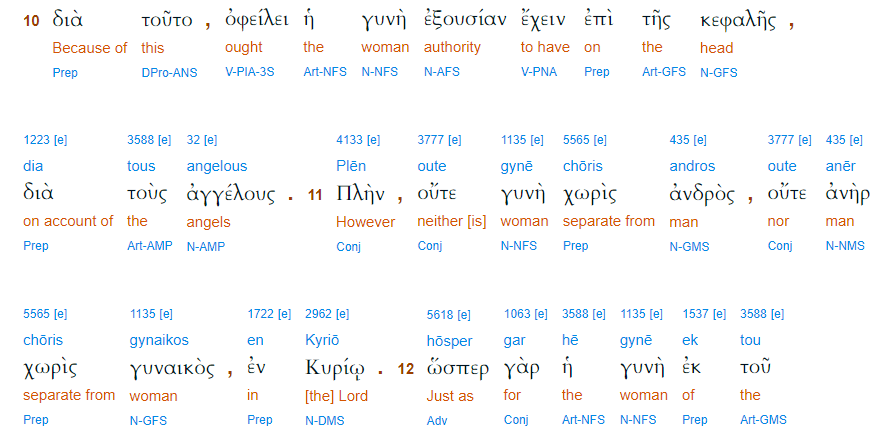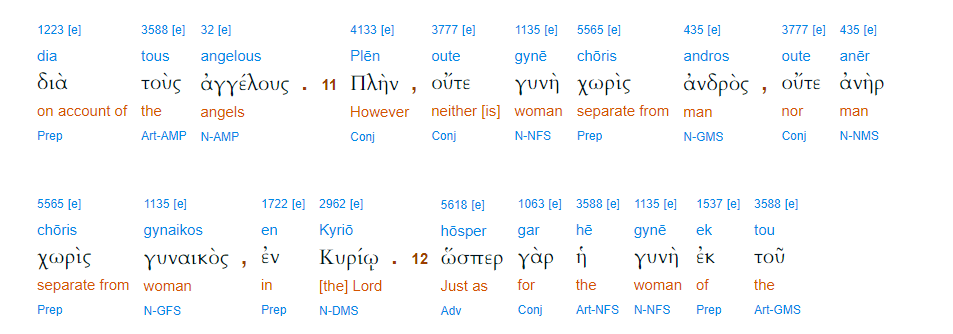Jason, thanks for your questions. They are appreciated and needed with such a novel translation. I don’t believe every piece of scripture or every piece of Paul’s writings are written like this. Each piece of literature has to be understood and analysed in its own right. It seems to me that there has been great difficulty understanding 1 Cor 11:2-16 as a whole, understanding how all the parts, all the different things Paul says, relate to each other. There is an article by Joel Delobel which attemps to account for everything Paul says in a coherent interconnected way. This is also what I am attempting. However, specifically, if Paul,in this specific instance, does formulate his (main) argument by using parallel statements, then we should not ignore this. And this should inform how we translate and understand his seemingly more obscure statements in the passage. Now to your questions.
- What do I see in the Greek manuscripts.
a. As per my argument about the structure of Paul’s argument. “Because of the angels” is an awkward fit with the structure and logic of Paul’s main argument. It is an awkward fit in verse 10.
b. There is nothing in the Greek manuscript that would say it must go with what is before it rather than what comes after. There are no capitals or commas or full stops. We must work it out from the argument and logic and I propose from the structure.
“On account of the angels” could just as easily go with the following “however”. There is no greek punctuation (textual warrant) to tell you it should or should not. You must look for other indications such as structure of argument and the logic of the argument itself. This is what I am doing. There is equally no greek punctuation or textual warrant to tell you that it SHOULD go with what proceeds it.
Am I moving it arbitrarily? In one sense yes. But, have the translators put it where they have arbitrarily? Possibly. They have put it there and we try to make sense of it.
You say “not because of some sort of textual warrant for doing so”. My textual warrant is that it does not fit well into the structure (parallelsim) of Paul’s argument. So, let us try to understand it in this alternative position. Now, I will later try to give an understanding of it in its new position. But because my location in v11 is novel, I am seeking input from others such as you, to help me think through what it could mean if it is part of verse 11. My interpretation warrant is that many of the explanations for because of the angels in v10 just pluck an understanding of “because of the angels” out of the air and interpret the verse in light of this foreign understanding. That is, many understandings of it in its current position seem be be eisegesis rather than exegesis, rather than understanding it in its place in Paul’s whole argument. That is where I am heading, but you will have to bear with me for more instalments. However, I do recognise that my propositions may be shot down in the process.
2. “what problems are you solving? … what additional clarity”. You will have to bear with me as I provide more instalments. There has been 2000 years of trying to understand “because of the angels” as part of verse 10 and 2 years of my thinking maybe it should be part of verse 11. So, I would invite you to think along with me. And maybe in the process convince me it is a dead end. I know, that so far, I have not given any in-depth clarity other than to intimate I think it has some connection to Psalm 8 because of Paul’s also mentioning “man is the glory of God”. I do have a view but it is fairly mundane and I am hoping to stimulate others to look at Psalm 8 in connection with 1 Cor 11:2-16 before I propose it in a later instalment. Also, by placing it in verse 11, it is then related to specific theology that Paul puts forward. It is no longer part of his main argument. The question changes from “what do the angels have to do with headcovering in church” to “what do the angels have to do with Paul’s theological statement ''neither woman separate from man, nor man separate from woman” in v11 and his subsequent statement in verse 12 “for just as, in the Lord, “woman out of man”, so also the man by/through the woman”. And further, what do these statements have to do with Psalm 8 and by connection of Psalm 8 being a commentary on Genesis 1&2, then what do these statements in vv11 & 12 have to do with Paul’s other statements from Gen 1 & 2 in 1 Cor 11:7 “man is the image and glory of God, but woman is the glory of man”? These things in v7 “image”, “glory”, “man”, “woman” also connect Gen 1&2 with Psalm 8.
As mentioned above I think I have a way of understanding 1 Cor 11:2-16 as an integrated whole and “because of the angels” relocation is just part of this. A very well known part which makes it a good starting point to get others looking and thinking about what I am proposing.
The issue of “because of the angels” is not just about us making a guess of what Paul could mean and trying to relate that guess to how it relates to v10 woman covering in church. There is a much wider issue that we have to come to grips with and promote from 1 Cor 11:2-16 and that is how Paul understands creation, the creation of men and women. Paul interprets and possibly even adds to or expands (or maybe I should say explains correctly) the old testament understanding of Gen 1&2 and Psalm 8. Many many commentators say that Paul got it wrong, that he does not understand Gen 1&2.
3. “any church fathers”. Not that I know of, but any others reading who are more widely read than I, might be able to comment further.
“any commentators”. Not that I know of.
So, as you can see, I do appreciate your questioning.
And please, bear with me in my future instalments, to see if I can tie this whole passage 1Cor 11:2-16 together as an integrated whole.
FINALLY, we have been talking about the location of “because of the angels”, which is only a very simple change, and only requires interchanging a full-stop and a comma in most English translations.
ESV That is why a woman … on her head**,** because of the angels**.** Nevertheless, in the Lord, woman is …
TO
That is why a woman … on her head**.** Because of the angels, nevertheless**,** in the Lord, woman is …
WHEREAS
the phrase “in the Lord” is moved substantially from its original position in the greek by many english translations.
e.g. ESV it is moved a whole verse away from end of verse 11 (beginning of verse 12) to the beginning of verse 11.
However, I propose that my leaving it where it is in the greek ie. as part of verse 12 makes much more sense and is a much more balanced argument by Paul in verses 11 and 12.
So, verse 11 & 12 both now have conditional/expansionary type clauses to match their theological statements about men and women.
v 11 However, because of the angels neither woman separate from man nor man separate from woman,
v12 For just as in the Lord the woman of the man, so also the man by the woman.
I propose that the whole argument flows much better this way.
This will help us to make the connection between Genesis 1&2 and Psalm 8. What is true “in the Lord” ie. Gen 1&2’s view and Paul’s view of men and women, is also true of Psalm 8.
“In the Lord” encompasses the created ordering of men and women “woman out of man” and the unity and interdependence of men and women “so also man by woman”. And that is also the picture of creation that we have in Psalm 8 “because of the angels”.
Yet, Psalm 8 does not mention “men” and “women” but only mentions man (?mankind).
Man and woman in Psalm 8 are presented as a whole, a unity, as mankind. Just as they are in Genesis 2 “woman out of man”. The woman is made out of the man. She is made out of his substance. They are one. To Paul, “woman out of man” is not an expression of inequality but of unity. Yes, they are diffferent and yes there is order, but they are the one substance.
Yet, Paul in 1Cor 11:7 takes the Psalm 8 “man … crowned with glory” and expands it in terms of Gen 1 “woman out of man” to say that man (male) is the glory of God and woman is the glory of man.
I think Paul in 1Cor 11:7 when he says “man is the image of God” actually means what he says that man/male is the image of God. But, equally what he means by “man is the glory of God” and “woman is the glory of man” is that man/Adam/male could not have been the image of God without the creation of woman “out of” him. Paul’s 1 Cor11:7 “man is the image and glory of God, but woman is the glory of man” is in effect a comment on Gen 2 “it is not good for the man to be alone”. For man/Adam to truly be the image of God required God to make woman out of him (so she is his glory). Man/Adam is the image of God BUT not without the creation of woman out of Him. So, she is his glory. They are in it together, just as we see pictured in the dominion of man/mankind in Psalm 8. Paul does not argue for egalitarianism, rather he argues for created order and the unity of interdependence. It is the same ideas that we use to explain the Trintity. Man and woman are the one substance, but are each persons. Egalitarianism misunderstands and misrepresents God’s creation and it is not what God has recreated us to be “in the Lord”.
NOW JASON, THIS IS WAY BEYOND WHAT YOU ASKED. BUT, IT GIVES YOU AN INDICATION OF WHERE I AM GOING AS I TRY TO EXPLAIN HOW 1 COR 11:2-16 IS AN INTEGRATED ARGUMENT AND ALSO INTIMATELY CONNECTED WITH HOW WE (or rather how Paul) UNDERSTAND GEN 1&2 and its place in our understanding ourselves as men and women as we live in the Lord.
However, as always, as I put forward my understanding of this passage and Gen 1&2, I value your hard questions, and I am opten to the possibility that through them I may have to recant my interpretations.
It is why I have written on this forum, to have you ask me these questions.





